Home | Front Page | Index | Blog | New | Contact | Site Map
Paris 1999 | Maps | Pics Day-by-day
Tourism
Daily Life
71 Rue de La Mare
Belleville
Computers
Metro
Objets Trouvés
Events
Gerry's Sketch
Hen Party
Jan's Birthday
Tour de France
Outings
Outside Paris
Fontainebleau
Giverny & West
Solar Eclipse
Versailles
Paris 1999
Paris 2005
Paris 2007
France 2007
Paris 2008
France 2008

Britain 1999
Beijing 1999
China 1999
Hong Kong 1999
Vietnam 2000
China 2000
Shortly after we got to Paris we heard from our friend Paloma that she might be coming to Paris. Could we get tickets to either or both of the quiz shows that she watches in Israel via satellite TV? Paloma is a translator from Hebrew and French to English and a champion Scrabble player. So it should be no surprise that she likes quiz shows based on words and that she understands the French. In fact, at the time of her request we did not know anything about either show, not even that they were on TV or that they were based on word games. But we thought it would be fun to go; we'd been to Hollywood TV productions and New York TV productions. Why not add that Paris feather to our cap?
Jan called and requested tickets. For one show, "Questions pour un Champion", they weren't recording until well after Paloma would have come and gone. But for "Pyramide" the timing was just right, so we requested three tickets. In about a week we got a letter inviting us to the Pyramide studio just to the north of the Paris city limits and at the same time we heard from Paloma that she wasn't coming. We decided to go anyway.
On the appointed day, July 12, we went to St Ouen by metro, and walked a few blocks to the studio. Actually, we arrived at 9:00 a.m and had some time to kill before the show doors were supposed to open. Just opposite the subway was a Prisunic - something like K-mart or Rite-Aide but not the same as either. We went in and bought some paper and envelopes, which we needed to write letters to those of our friends without email that we'd been promising ourselves we would write to.
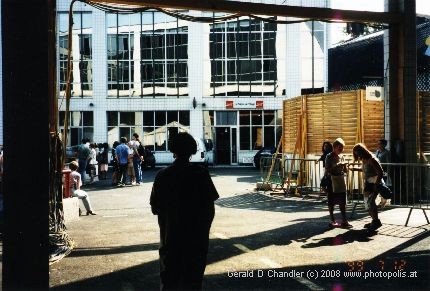
TV Courtyard |
At the studio complex there was a receptionist and we asked where we should go. It turned out the waiting room was an outdoor courtyard (shown left) with bits of dismantled studios, a few parked cars, the backdoor to a bar/bistro and nowhere to sit. We were the first, and as Gerry always does, he found the shadiest spot. Over the next half an hour others showed up, also shown in the photo.
The original letter that invited us to the show also reminded us to come with a list of 20 words. We had no idea to what end the words would be used. Pyramide is broadcast every weekday at 12:20 but we'd never managed to watch it; we were always out at some museum or the like or just plain forgot because we were watching the Tour de France.
Gerry decided to make a list of words. He conveniently had the tablet that he had just bought at Prisunic and he had a half an hour to wait. Why not? But what words? The total solar eclipse of August 11 was already in the news and he decided that astronomy would be his theme. After "planet," "eclipse," and "constellation," it was hard to find 17 other words that fit the theme. But he finally managed it.
At about 10:00 the doors to the studio were opened and in we went. We were third or fouth in the line. The studio has a familar ring to it: two banks of bleacher seats facing a stage. A young man, maybe 30 (below, with Gerry talking to him) had opened the door and was leading everybody into the studio. He was clearly "Mr Welcome" or "Mr Assistant Director". Let's just call him Jacques, as others did.
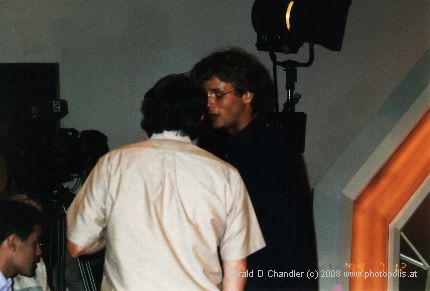
Gerry speaking with the assistant animator |
Jacques gave directions to the crowd in such a low voice that only the first three or four people could have heard him. That's the French way: as we were to see that day and many other times, the French sense of "organization" is not the British-American one. We had to ask him what he'd said, and he replied it was just "Bonjour, Bienvenue, Suivez-moi."
When we were all seated Jacques asked everybody for the list of words. He reminded us that the author's name should be on the paper. Gerry quickly added his name, folded the paper in three, and turned it in. All the names went into a bowl and another assistant "animator" drew two. Gerry immediately saw that one was his; he, unlike all the others, had put his name on the side folded out and could easily read it.
Jacques looked around for the two people whose word lists were selected. He was rather surprised to find that the American he had briefly spoken to earlier was one of them. Gerry's list was in English, but Jan had translated what she could of it to French. Jacques circled five words that he thought (according to criteria we were completely unaware of) were the best.
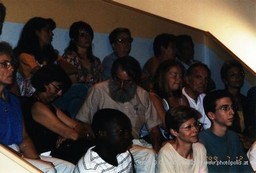
Gerry in Pyramide Audience |
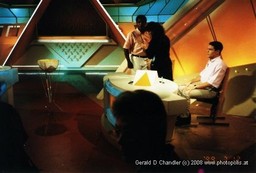
Practice Contestants |
Gerry and the girl whose list was chosen were asked to move from their original seats to the center of the stage-right bleacher. You can see them in the photo above left, just before the show got started. She's on Gerry's left. Jan thinks she is Jacques' girl friend. Was that why her list was picked? You can see almost everybody in the bleachers which shows you how small the audience was.
It was during the practice run-through before taping that we got an idea of how the show works. There are two teams of two people; each team consists of one of the two contestants and one of the two resident experts, who appear every show.. The two teams sit facing each other (see photo above right) with the moderator in the middle. The two residents are clearly well known to the audience; only by later watching the show did we learn the experts' names: Laurent Broomhead and Claire Gartrand. During the taping we picked up that Claire had once been a contestant herself. The photo shows Hourari, one of the days's contestants being fitted with a microphone. This show was his ninth consecutive appearance. The fellow sitting down is a future contestant standing-in for Laurent, the resident expert on this team, since this was a practice session.
In the photo below left, we see the other constestant, Jacqueline; she is the woman on the right in the mostly black dress. The woman on the left is another future contestant standing in for Claire. Jan took the picture from the bleachers where we originally sat and where she stayed for the entire show. Gerry has already moved to the bleachers on the left side.
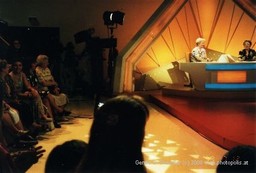
Pyramide Audience Watching Contestants |
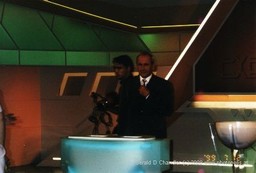
Patrick, the Moderator |
After the practice session was over the true host came in, Patrice Laffont (see photo above right). He wasn't introduced as that must have been unnecessary to everybody but us; we had to learn his name from the TV credits. To our eyes he seemed pretty bored with the whole thing. He's obviously been doing it for a long time and knew how to handle every circumstance.
The basis of the contest is to guess a word, somewhat in the fashion of charades. Instead of acting out the word, single-word clues are given. There are always five words to guess and a total of 13 clues allowed. For any one word one person on the team gives the clues and the other tries to guess the word.The person who gives the clues (and who knows the difficulty of the word) says how many clues he will use. For example, if the word is "constellation" and the clue-giver specifies two clues, his first hint might be "stars" and his second might be "group". One has to be economical with the clues; otherwise there may be none left for the fourth or fifth word.
Pyramide has four segments: In the first segment there are four sets of five words; each person on each team takes a turn at giving the clues and then at guessing the words in a set. After attempting to guess the five words, a saying or quote is shown to the contestant that contains all five of the set's words. Those correctly guessed appear in the saying; there are blanks for those not guessed. From the saying, the team has to determine the author or item indicated by the title. For this segment there are six topics or titles for the sayings. The contestants choose which of the six topics they will work; by the time the fourth set takes place there are only three topics from which to choose. Points are awarded for each word guessed correctly and for getting the saying's author or other items.
The second segment is called "Ping Pong". Here, instead of one team trying to get the words, they alternate guesses. And that's where the studio audience gets involved and where Gerry got involved. More of that in a minute.
In the third segment there are six topics. Again the person guessing chooses the topic. One from our show was "Countries with P". From each clue a guesser has to determine a country. Another was "wives". From clues about the husband the guesser had to determine the wife. In this segment the team that bids the lowest number of guesses gets to try first.
The fourth segment only involves the highest scoring team. It's called the Pyramide. Five phrases are shown on a screen visible only to the contestant. He must give clues that allow his/her partner to guess them, and do it all in about two minutes. There are no limits on the number of clues but the clock ticks pretty fast and is animated by a water level that first rises to the top of the pyramid then falls back to the bottom. If all five of the "pyramid" words are guessed then the "Pyramide Prize" is won; otherwise it increases by 4000 F (about $650) for the next show. It would seem that there is a winner in about one of ten shows. We sat throught two tapings and it was not won either time.
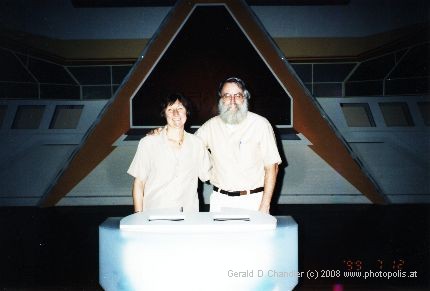
On the Set after the Show |
After the show we went to the host's spot and declared ourselves winners of Pyramide. Actually that did very little good, since we didn't get any money. Now what about "Ping Pong" and Gerry's part in it? Well, you can see him on French TV about August 19 when he will speak French with a strong American accent.
At the start of "Ping Pong" the two people whose lists were drawn are briefly introduced and one of the contestants is asked to choose which of the two forms of the game will be played. The lady in the black dress pictured above was asked to pick and she said she'd take "Barge-a-boule." With that Gerry was asked by Patrice Laffont to pick up the microphone that was sitting nearby and for him to say a few words. Gerry explained (in French) about Paloma, and never having seen the show, and how it was a great show and how he was very pleased to be there. That pleased the studio audience and they gave him a big hand. (We don't know what the other form is and whether Gerry would still have been asked to say something.)
If all five words are guessed by one or the other team then the person whose list was not picked gets a nice prize and a consolation prize (a one year subscription to a TV guide) goes to the one whose list was picked. If any word is not guessed then the good prize goes to the person whose list was picked. You'll have to wait until August 19 to see what Gerry won.